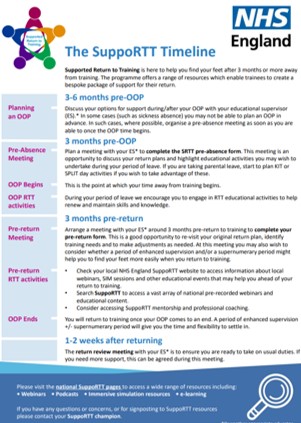Process and Forms
SuppoRTT HomeProcess & FormsNW SuppoRTT CourseSuppoRTT ChampionsPeer SuppoRTTIMGs
Applying for ActivitiesSuppoRTT Activities CalendarCoachingSuppoRTT ResourcesContact the Team
SuppoRTT Process and Forms
GuidanceTimelinePre-AbsencePre-ReturnEnhanced SupervisionPost-Return ReviewOpt Out
- The SuppoRTT programme is designed to support you and keep you and your patients safe.
- Completion of the forms is necessary as NHSE is required to report on the numbers of individuals being supported by this programme which enables us to justify funding for the programme.
- To access RTT-A funding from SuppoRTT the activity needs to be noted on one of the meeting forms.
Please click here to view the NW SuppoRTT Guidance document.
Who is SuppoRTT for
- any postgraduate doctor, dentist or public health practitioner on a North West training programme who is taking time out of training for 3 months or more
- those who take shorter than 3 months and feel they would benefit from a supported return to training
- any international medical graduates with an NTN who are due to start their first NHS training post (or who have started in the last 6 months)
- GP IMGs who have spent their first 6-12 months in a GP practice and are now starting their first hospital training post
What are SuppoRTT meetings
They are a virtual or face-to-face discussion with someone who knows you and your training, i.e. ES/TPD, about your time out of training and completion of the associated meeting form.
Timeline
Click on the image below to read the SuppoRTT timeline:
Pre-Absence
| When | 6-8 weeks before your time out of training begins |
| Things to discuss |
|
Useful Links
- AoMRC Planning an Absence from Practice Recommended Questions and Actions
- Lead Employer New Parent Support Resources
Pre-Return
| When | 12 weeks before your return date |
| Things to discuss |
|
Useful Links
What should you expect when you return to training?
Your TPD/FPD/Supervisor, Service Lead, Rota Coordinator and HR department must be aware of your return date and must plan an initial induction session for you. This should include: Essential Employer induction (security, ID badges, Parking etc.), a plan of activities for the first week, awareness of key policy or procedural changes, awareness of new personnel, awareness of key new equipment.
- You should not be on any part of the rota which would mean you are working without senior supervision during this period (for many specialties this would mean no nights or on-calls).
- It is the responsibility of the TPD or ES to ensure that medical staffing and rota coordinators have this information and adhere to this plan.
- It is the responsibility of the TPD or ES to ensure that all clinical supervisors who will be working with you at the point of your return are aware of their requirement for enhanced supervision.
Enhanced Supervision
An enhanced supervision period is typically described as:
“a short, intensive period of enhanced supervised practice, focused learning activities and direct observation of clinical activities with the aim of enabling trainees to return to normal duties safely and confidently. It is expected that during this time trainees may not be required to undertake any out of hours arrangements if adequate supervision isn’t available.”
In order to rapidly regain clinical knowledge and confidence, those returning to training following prolonged time out of in training are strongly encouraged to participate in a period of enhanced supervision for at least 10 working days on their return to work.
During this period;
- You will participate in closely supervised work and by the end of the period you should be working at a level commensurate with re-entry into the training programme.
- You will be paid for this period at your usual rate via payroll, as if you had returned to your usual working pattern.
This period may or may not be counted towards your training and should be discussed with your training programme.
Useful Links
Post-Return Review
| When | Towards the end of your enhanced supervision period |
| Things to discuss |
Please note: it is recognised that some returners may require a longer period of enhanced supervision than first planned. This is acceptable providing it is mutually agreed. |
Opt Out of SuppoRTT
This is applicable to anyone taking time out of training but will continue to work clinically during this period (i.e. OOPT, OOPR but maintaining on-calls etc.) and feels they will not benefit from SuppoRTT when they return to training.
| When | You can complete this form at any point prior to or during your time out of training. |
| Things to discuss |
|
Page updated 10th November 2025
